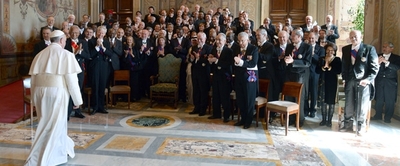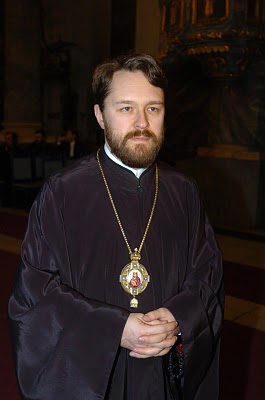Speaking in French today, Pope Francis gave his talk in Italian outlined to the world’s diplomats the mission of his pontificate: building peace AND constructing bridges of dialogue, combatting spiritual AND material poverty. This is part 2 of his “pontifical program of ministry.” The Pontiff met the more than 180 accredited diplomats in Sala Regia of the Apostolic Palace, the Vatican.

World map of the Vatican foreign relations; dark green: diplomatic relations, light green: other relations, gray: no official relations (credit: Wikipedia)
Heartfelt thanks to your Dean, Ambassador Jean-Claude Michel, for the kind words that he has addressed to me in the name of everyone present. It gives me joy to welcome you for this exchange of greetings: a simple yet deeply felt ceremony, that somehow seeks to express the Pope’s embrace of the world. Through you, indeed, I encounter your peoples, and thus in a sense I can reach out to every one of your fellow citizens, with their joys, their troubles, their expectations, their desires.
Your presence here in such numbers is a sign that the relations between your countries and the Holy See are fruitful, that they are truly a source of benefit to mankind. That, indeed, is what matters to the Holy See: the good of every person upon this earth! And it is with this understanding that the Bishop of Rome embarks upon his ministry, in the knowledge that he can count on the friendship and affection of the countries you represent, and in the certainty that you share this objective. At the same time, I hope that it will also be an opportunity to begin a journey with those few countries that do not yet have diplomatic relations with the Holy See, some of which were present at the Mass for the beginning of my ministry, or sent messages as a sign of their closeness – for which I am truly grateful.
As you know, there are various reasons why I chose the name of Francis of Assisi, a familiar figure far beyond the borders of Italy and Europe, even among those who do not profess the Catholic faith. One of the first reasons was Francis’ love for the poor. How many poor people there still are in the world! And what great suffering they have to endure! After the example of Francis of Assisi, the Church in every corner of the globe has always tried to care for and look after those who suffer from want, and I think that in many of your countries you can attest to the generous activity of Christians who dedicate themselves to helping the sick, orphans, the homeless and all the marginalized, thus striving to make society more humane and more just.
But there is another form of poverty! It is the spiritual poverty of our time, which afflicts the so-called richer countries particularly seriously. It is what my much-loved predecessor, Benedict XVI, called the “tyranny of relativism,” which makes everyone his own criterion and endangers the coexistence of peoples. And that brings me to a second reason for my name. Francis of Assisi tells us we should work to build peace. But there is no true peace without truth! There cannot be true peace if everyone is his own criterion, if everyone can always claim exclusively his own rights, without at the same time caring for the good of others, of everyone, on the basis of the nature that unites every human being on this earth.
One of the titles of the Bishop of Rome is Pontiff, that is, a builder of bridges with God and between people. My wish is that the dialogue between us should help to build bridges connecting all people, in such a way that everyone can see in the other not an enemy, not a rival, but a brother or sister to be welcomed and embraced! My own origins impel me to work for the building of bridges. As you know, my family is of Italian origin; and so this dialogue between places and cultures a great distance apart matters greatly to me, this dialogue between one end of the world and the other, which today are growing ever closer, more interdependent, more in need of opportunities to meet and to create real spaces of authentic fraternity.

In this work, the role of religion is fundamental. It is not possible to build bridges between people while forgetting God. But the converse is also true: it is not possible to establish true links with God, while ignoring other people. Hence it is important to intensify dialogue among the various religions, and I am thinking particularly of dialogue with Islam. At the Mass marking the beginning of my ministry, I greatly appreciated the presence of so many civil and religious leaders from the Islamic world. And it is also important to intensify outreach to non-believers, so that the differences which divide and hurt us may never prevail, but rather the desire to build true links of friendship between all peoples, despite their diversity.
Fighting poverty, both material and spiritual, building peace and constructing bridges: these, as it were, are the reference points for a journey that I want to invite each of the countries here represented to take up. But it is a difficult journey, if we do not learn to grow in love for this world of ours. Here too, it helps me to think of the name of Francis, who teaches us profound respect for the whole of creation and the protection of our environment, which all too often, instead of using for the good, we exploit greedily, to one another’s detriment. The Pope said:
Dear Ambassadors, Ladies and Gentlemen,
Thank you again for all the work that you do, alongside the Secretariat of State, to build peace and construct bridges of friendship and fraternity. Through you, I would like to renew to your Governments my thanks for their participation in the celebrations on the occasion of my election, and my heartfelt desire for a fruitful common endeavor. May Almighty God pour out his gifts on each one of you, on your families and on the peoples that you represent. Thank you!


